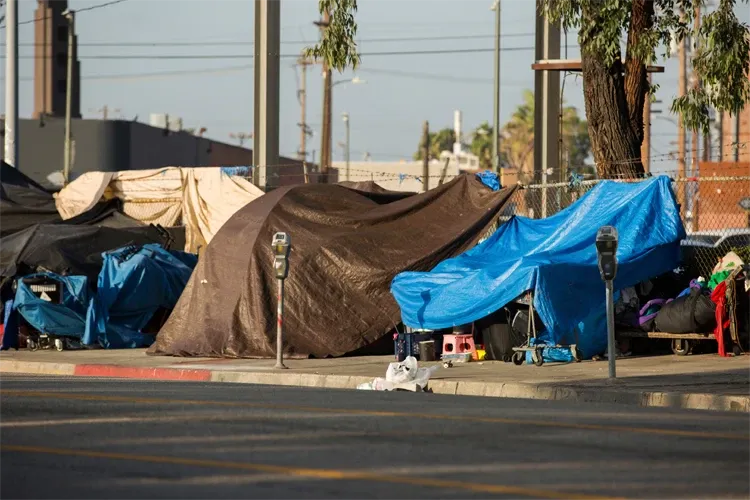Money. Money. Money.
Whenever anyone — a politician especially — talks about fighting poverty, they tend to talk in terms of money. How can we get more monetary capital into the hands of people living below the poverty line.
The worst of the solutions is pure welfare: “free” money in the form of goods, services, or cash. The problem, of course, is that money runs out. If you give a man a fish, he’ll need another one. And if he can’t get it for himself, you’ll have to give him another one.
There are somewhat better programs that focus on helping people “learn how to fish.” And I’m sure some of these programs produce good results and truly help people get back on their feet.
But what impact has this mix of welfare and work programs had on poverty?
It certainly hasn’t fixed the problem. According to federalsafetynet.com, a website run by poverty expert and author Robert Pfeiffer, the federal government spent $1,363 in welfare per person in poverty in 1966. Today, the feds spend $27,740 per person in poverty. That’s $111,291 for a family of four — which is much more than the poverty threshold for that same family. Despite this spending, the poverty level has hovered between 11-15% of the population since 1966.1
So what’s the problem?
It’s not an issue of too little money — there’s $111,291 available per person in poverty. It’s not that there’s no supply of essential goods and services — most people in America have near-instant access to everything they could ever need. It’s not a lack of jobs — companies are currently begging people to come work for them.
Instead, the issue is moral.
Today, the feds spend $27,740 per person in poverty. That’s $111,291 for a family of four — which is much more than the poverty threshold for that same family. Despite this spending, the poverty level has hovered between 11-15% of the population since 1966.
Let me first make a qualification: there are circumstances where an individual’s moral failure did not cause their poverty. Legitimate illness, debilitating disease, or catastrophic injuries are examples. And often, since “poverty” is measured merely by annual income, some people who are technically in poverty could have legitimate reasons such as being in school full-time, leaving work to care for a sick parent during part of a year, or retiring early and living off of past assets that are not factored into their annual income.
These legitimate cases aside, observable poverty is generally caused by a moral failing such as drug or alcohol addiction, laziness, or lack of self-control about money.
In these cases, government action has shown itself to be powerless over the past 70 years — and the Church has the only answer.
The Church’s most potent weapon against poverty in America is the preaching of the law and gospel that changes men into the image of Christ. This makes them able to provide for their own families and be generous with whatever extra God gives.
Paul describes people outside of Christ as “slaves to sin” (Rom. 6:17). The unbeliever’s issue is not merely about behavior — it's about the nature of the sinner. His will is in bondage to sin. He is completely dominated by it.
This enslavement can make men launch themselves at their carnal lusts despite the poverty it brings. And until there is a fundamental change in the nature of sinners, no amount of government welfare will be able to solve the problem.
People enslaved to their lusts will continue to sacrifice the financial stability of themselves and their families.
And this is where the Church brings good news.
Yes, the Church should continue and even improve its mercy to the poor. Yet in all this, we must never forget the root of the problem. Men’s hearts need to be set free from bondage. Money, government welfare, or even job training programs can’t do that — only the gospel can.
It’s through the preaching of the Gospel that this enslavement can be broken. When God calls a sinner to Himself, he is “set free from sin” and becomes “a slave of righteousness” (Romans 6:18, NKJV).
Now set free, that man needs to be instructed in righteousness. He needs to learn from the Scriptures which are “profitable for doctrine, for reproof, for correction, for instruction in righteousness” (2 Timothy 3:16). The Church plays a primary role in this as it proclaims, not only the Gospel, but the Law of God. Paul tells the Thessalonians to “admonish the idle” (1 Thessalonians 5:14).
As the Gospel is preached and the Holy Spirit sanctifies people according to the Law of God, those who were once enslaved to the carnal lusts which sent them into poverty can now overcome them. They are able to control their desires. Their god is no longer their belly (Philippians 3:19). And they are able to “work heartily, as for the Lord and not for men” (Colossians 3:23) and “work in quietness and eat their own bread” (2 Thessalonians 3:12).
Yes, the Church should continue and even improve its mercy to the poor. Yet in all this, we must never forget the root of the problem.
Men’s hearts need to be set free from bondage. Money, government welfare, or even job training programs can’t do that — only the gospel can.
1. https://federalsafetynet.com/poverty-and-spending-over-the-years-2/



